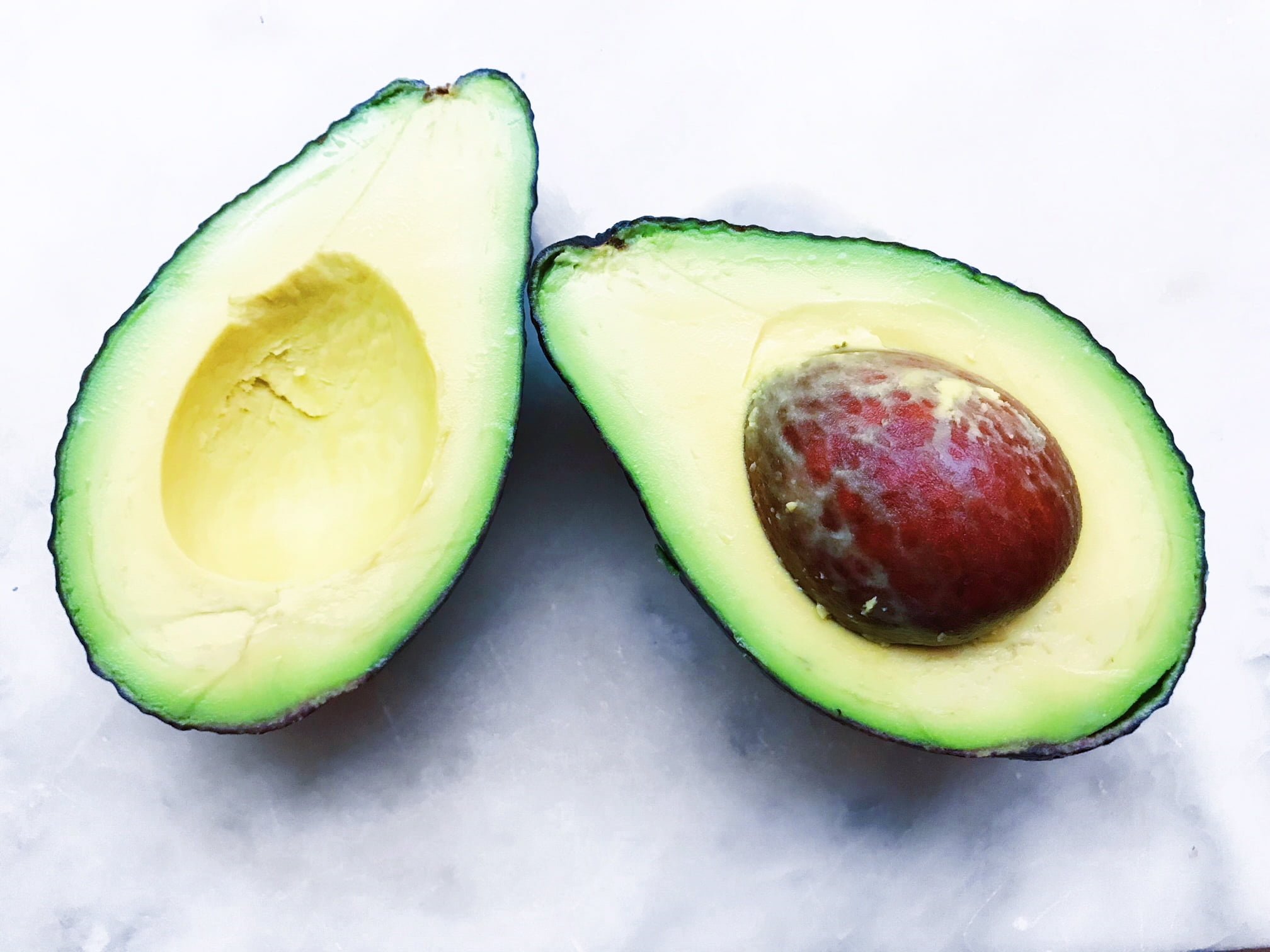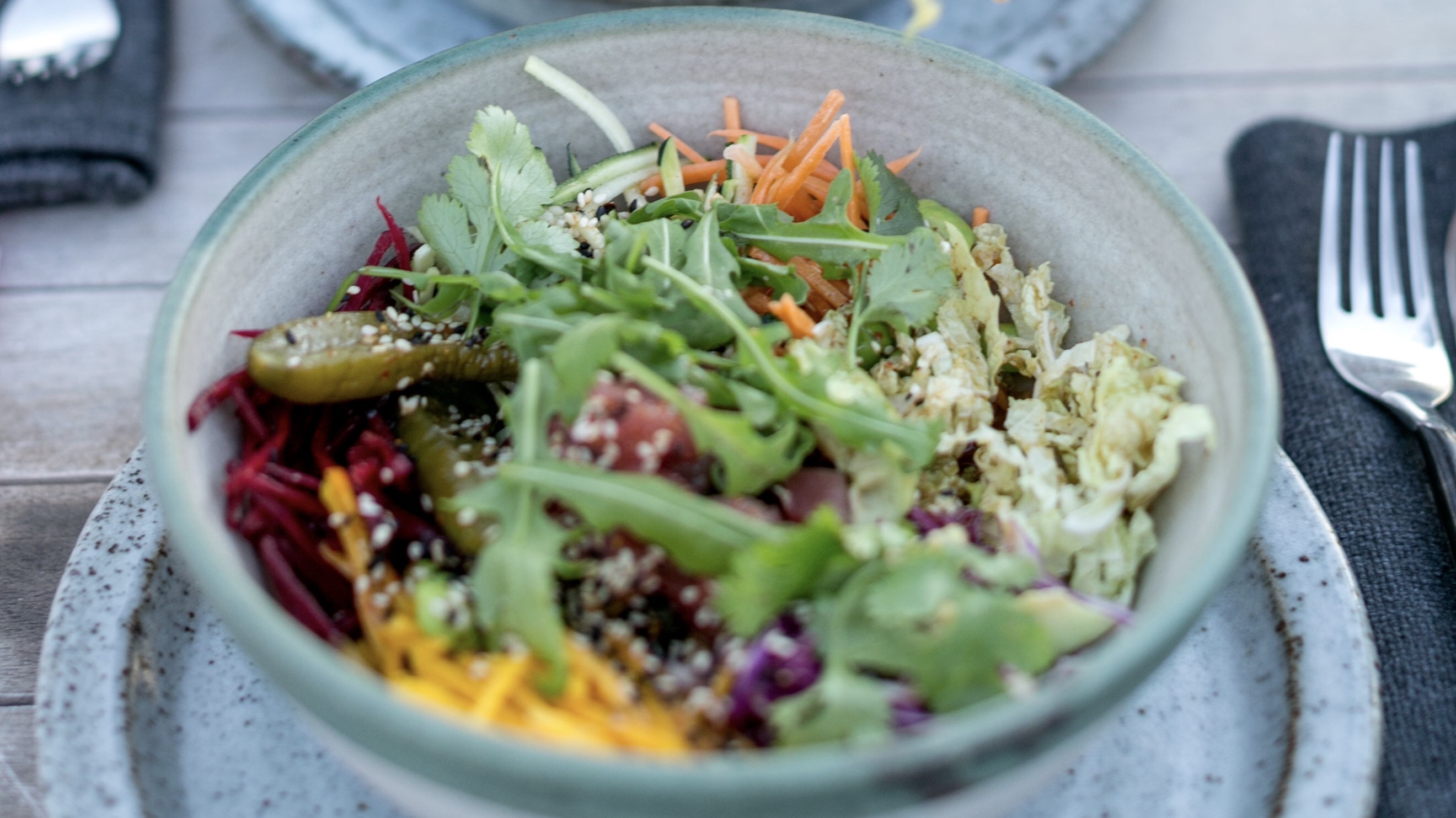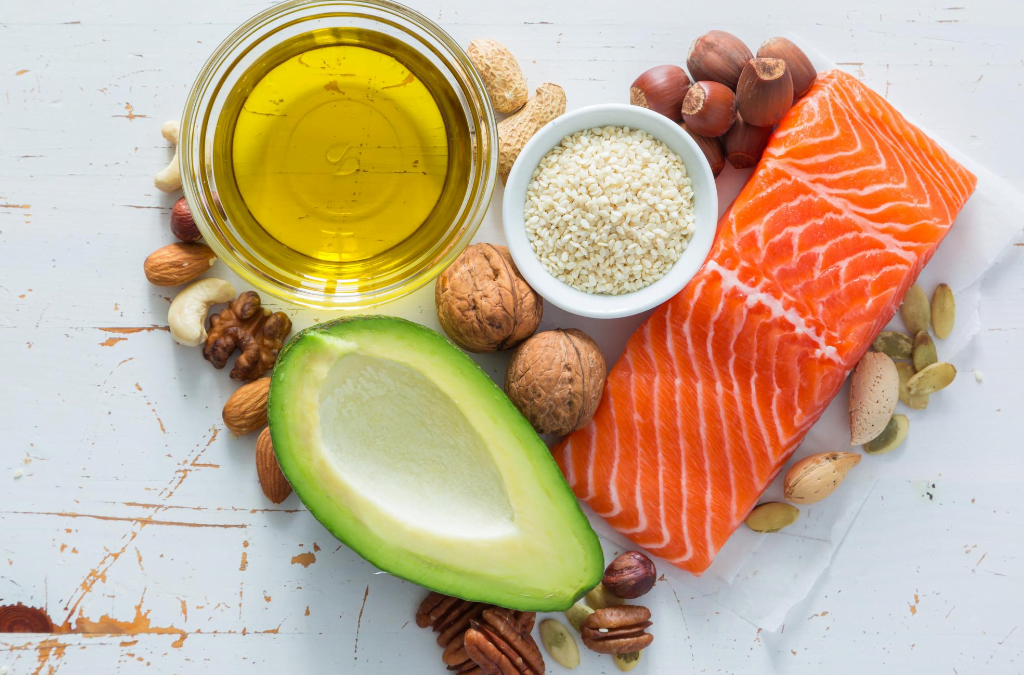When eaten in large amounts, all fats, including healthy fats, can contribute to weight gain. However this does not mean that fats make you fat. Too many calories, no matter where they are coming from, will contribute to weight gain if you are not burning them off.
Fat is higher in energy (calories / kilojoules) than any other macronutrients (i.e. carbs and protein), so eating less fat overall can help with weight loss. This is where the whole the low-fat / no-fat diets in the 90’s stemmed from. FYI – If you’re not aware, there were an array of low-fat / no-fat diets & food products released in the 1990’s which led many to believe that you needed to eliminate fat from your diet in order to lose weight.
Thankfully though, science has shown us that some fat is actually essential to our health and that eating fat doesn’t simply “make you fat”. There are certain fats that, when consumed in the correct healthy amounts, actually help with weight loss and healthy weight maintenance. In fact, these fats are vital to our health and if you simply eliminate these fats from your diet by following a no-fat / low-fat diet, your skin, hair, hormones & energy levels will all suffer and you can put yourself at risk of developing serious health & metabolic conditions.
To understand why fats don’t necessarily make us fat & why they are so vital to our health, let’s have a look what dietary fats actually are & which ones you need to be eating.

Fats – Why We Need Them
Fat is a macronutrient that is essential to our health. Fats have many vital roles including:
- helping absorb & transport fat soluble vitamins (vitamins A, D, E & K) around our body
- protecting our organs
- insulating us to keep us warm
- reducing inflammation in our bodies
- providing our bodies with essential fatty acids which are required to build & maintain our cell membranes in our skin, hair, eyes, heart & brain
- helping make certain hormones
- keeping our heart healthy
- helping you feel satiated / full after a meal

Signs of Inadequate Fat Intake
If you are not consuming enough fats, you may notice the following symptoms:
- Dry & scaly skin
- Dry eyes
- Constantly cold
- Dry hair / hair loss
- Hormonal problems including loss of menstrual cycle
- Inability to feel full / always hungry
- Issues concentrating / mental fatigue
- Fat soluble vitamin deficiencies
- Constant fatigue
As you can see, fat is necessary for good health & an essential part of our diet. So know that we know why we need to be eating fats, lets have a looks at the different types of fats and which ones you should be eating in healthy amounts when you’re trying to lose weight & maintain good health.

Fats – The Different Types
- Unsaturated Fats – these are classified as “healthy” fats and are essential for good health. There are two main types of unsaturated fats: polyunsaturated fats and monounsaturated fats. Polyunsaturated fats include: 1) Omega-3 fats which are found in oily fish such as salmon, tuna, sardines and anchovies, walnuts, canola oil, soy products, flaxseeds and omega-3 enriched eggs. 2) Omega-6 fats which are found in some oils like safflower and soybean oil, along with some nuts & seeds.
- Monounsaturated Fats – these are also classified as “healthy” fats and are found in avocados, olive oil & nuts like cashews, almonds etc.
- Saturated Fats – these fats are aren’t classified as healthy fats because eating greater amounts of saturated fat has been found to be linked with high blood cholesterol, which a risk factor for heart disease. These fats are solid at room temperature and are found in 1) Animal-based products, 2) Dairy foods –butter, cream, ice-cream, milk, cheese, 3) Meat – red meat, processed meats & chicken, 4) Some plant-derived products including coconut oil*/cream, palm oil and cooking margarine, 5) Process foods – deep fried foods (eg chips, pies, battered foods), fatty snack foods, packaged cakes and biscuits, pastries and pies.
- Trans Fats – these are classified as “unhealthy fats” because they increase your level of bad (LDL) cholesterol and decreases the level of good (HDL) cholesterol in the body, which increased your risk of heart disease. Trans fats are actually unsaturated fats that have been processed & behave like saturated fats inside the body. Trans fats are found in processed foods like deep fried foods, commercial baked pies, pastries, cakes and biscuits. Spreads and margarines can also contain trans fats.
*A Note on Coconut Oil – Coconut oil is rich in saturated fat (around 85-90% saturated fat) & particularly high in one type of saturated fatty acid called lauric acid. Lauric acid can mimic “healthy” unsaturated fats by increasing our HDL (good) cholesterol. So this is a positive for coconut oil & makes it less concerning than other saturated fats, like those found in meat or processed foods. Coconut oil can also help with making you feeling full & satisfied after a meal. However, research has also found that coconut oil can increase our total cholesterol & unhealthy LDL cholesterol in our blood. While much more research needs to be conducted on coconut oil, based on the current evidence, I would not recommend coconut oil to those at risk of/with heart disease. Further, coconut oil doesn’t provide the beneficial vitamins or the polyphenol antioxidant compounds like those found in extra virgin olive oil. For for these reasons, I still recommend choosing olive oil over coconut oil as your primary oil of choice. And remember, this is not to say you shouldn’t ever use coconut oil, just note that you will get more healthy benefits from regularly using olive oil.

Which Fats & How Much Should You Be Eating?
If you are trying to lose weight, you should NOT simply cut out all fats from your diet. Instead you should aim to reduce your overall intake of saturated and trans fats from the foods listed above, and replace them with small to moderate amounts of unsaturated fats from the list above.
Here are some ways to include healthy fats in your diet:
- Add a sprinkle of seeds (like sesame seeds, pumpkin seeds & pinenuts) & nuts (like amonds and walnuts) to your salads & stir–frys. Try my homemade Poke Bowls with added seeds here.
- Use avocado as a spread & in salads
- Don’t hold the dressing – use extra virgin olive oil for salad dressings. Try my healthy Salad Dressing recipes here.
- Stirfry and bake your veggies with a small amount of olive oil
- Enjoy a serve (150g) of salmon, tuna and other fatty fish with your meals – try my Healthy Salmon & Veggie Pizza here or my Healthy Basil & Cranberry Salmon Pasta Recipe here
- Snack on a handful of nuts & seeds
- Buy breads & crackers with seeds through it
- Add a sprinkle of chia seeds, LSA & nuts into your smoothies & homemade snacks like muffins. Try my Persimmon & Chia Wellness Smoothie here
- Try a small spread of nut butters and tahini
- Add a tablespoon of nuts and seeds to mueslis, porridge, yoghurt etc

Remember, all fats, even the healthy fats, can contribute to weight gain if you consume more than you’re body needs, so don’t go overboard. For example, if you are eating nuts as a snack, have a handful not the entire jar full. Or if you are using avocado as a spread, use 1/4 or an avocado, not the entire avocado for yourself. Also, mix things up with your fats – if you’ve had a handful of almonds at morning tea, choose a different snack for afternoon tea.
It is recommended that our total fat intake should be around 25-30% of our total energy intake. Saturated fat should be no more than 10% of our total energy intake, which leaves the remainder as unsaturated fats & for best health, you should replace as much saturated and trans fats with unsaturated fats in your diet as you can. It’s recommended that Australian adults have 250-500mg of marine omega 3 each day to reduce their risk of heart disease; which can be achieved by having 2-3 serves (150g each) of oily fish per week, as well as having 1g of omega-3 from plant sources.
If you are unsure of how much you need to be eating for your own individual weight loss goals and health, consult a dietitian.
Take Home Message
Fat is essential to your health and you should not eliminate all fats from your diet when trying to lose weight. Instead, reduce your intake of saturated and trans fats and consume small amounts of healthy unsaturated fats.


Brilliant article. So comprehensive and accessible.
Great, comprehensive article. Thank you 😊 & congratulations on the birth of your little man.
Kind regards,
Diana